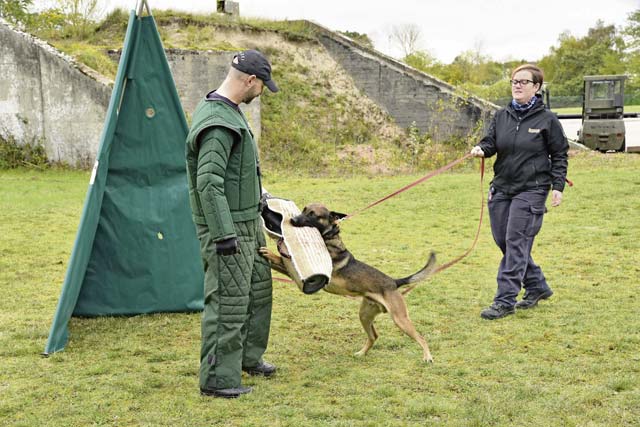
Germersheim, Germany — Dogs of the Polizeipraesidium Rheinpfalz Diensthundestaffel, or working dog unit, are required to pass an annual certification to ensure they are properly trained and ready for the job. This year, for the first time, the test was conducted at Germersheim Army Depot with support from U.S. Army Garrison Rheinland-Pfalz.
Soldiers of the 100th Military Working Dog Detachment, 92nd Military Police Company, monitored the four-day certification Oct. 23 through 26.
Volker Claus, chief of the 18-dog unit in Edenkoben, Germany, explained the limitations he faces when finding proper areas to train and test in the local area. Obedience drills, including bite-and-release training, require large open spaces without public distractions. Protection drills, involving the dog searching a building for a criminal, require empty buildings with several hallways and rooms to create a challenging scenario.
“We need objects, buildings and large grassy areas for training with the dogs, and it is difficult to find them. Here (at GAD), we have everything we need,” Claus said.
Though the certification process differs from the one used by the Army, Soldiers were able to observe and learn different training techniques.
Sgt. Nicholas Milano, squad leader and MWD handler of the detachment, explained that allowing the polizei to use Army training areas helps build a relationship that is beneficial for both teams.
“Dog training changes every day, so we need to be open-minded in this job. There are a lot of things we can learn from them and they can learn from us,” Milano said.
During the certification, Claus and Milano, along with members of their teams, had the opportunity to share information about various techniques and objects used when training the dogs. The Army and the Polizei have different materials available when it comes to narcotics and explosives used for MWD training, so the possibility of conducting joint-training exercises could be beneficial for all dogs and handlers involved.
“The more samples you can provide for the dog, the better trained the dog will be and the more products he’ll be able to detect,” Milano explained.
The detachment previously partnered with local Polizei working dog units in Kaiserslautern, but this was their first interaction with the Edenkoben unit. Though the partnership is in its early stages, the teams expressed interest in a continued relationship, including an invitation from Claus for Milano and his team to visit the station.
“This week’s training helped foster a relationship,” Milano said. “We’re building a foundation to continue working together.”


